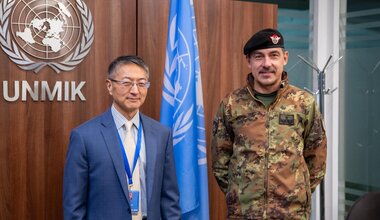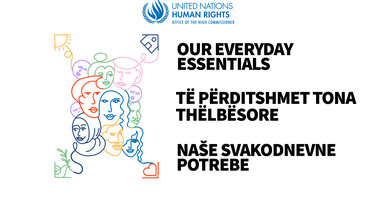Full report of the latest Security Council's session on Kosovo
Reconciliation Processes in Kosovo Must Ultimately Reinforce Each Other, Top United Nations Official Tells Security Council
- Download briefing and statements from the Security Council's 7811th meeting held on Wednesday 16 November 2016, 3 p.m.
- Access the video from the archives on United Nations Mission in Kosovo (UNMIK) - Security Council, 7811th meeting
Serbia’s Foreign Minister, Kosovo Speaker Cite Causes of Tension while Affirming Readiness to Continue Belgrade-Pristina Dialogue
Reporting that the consolidation of stability continued to progress in Kosovo but was threatened by tensions at both the community and higher political levels, the senior United Nations official there told the Security Council today that all reconciliation processes must ultimately reinforce each other.
“I hope what awaits Kosovo in 2017 is political dialogue accompanied by necessary progress at the community level,” said Zahir Tanin, the Secretary-General’s Special Representative and Head of the United Nations Interim Administration Mission in Kosovo (UNMIK). Presenting the Secretary-General’s latest three-month report on the Mission (document S/2016/901), he said it welcomed Kosovo’s overall economic and political progress despite the challenges.
Among the causes of tension were a draft law intended to ratify an agreement with Montenegro on territorial delineation, and the adoption of a law on a local mining and industrial complex, he said. With the latter issue creating additional public tension between Pristina and Belgrade, implementation of the agreements reached within the framework of the European Union-facilitated dialogue between the two sides continued only at a slow pace, according to the report. Indeed, the agreed establishment of the Association/Community of Serb Municipalities in northern Kosovo had made little progress, Mr. Tanin said.
Despite polarization at higher political levels, recent surveys indicated little ethnic division in priorities at the community level, he said, noting that unemployment, corruption and lack of economic development were the biggest concerns. Yet, reconciliation efforts by municipalities remained mixed, he said, citing examples of both progressive and regressive actions. The European perspective remained a force for stabilization throughout the Balkan region and progress had been made in consolidating the rule of law, with officials tackling corruption and the Kosovo Specialist Chambers nearing full functionality, he emphasized.
Following that briefing, Serbia’s Minister for Foreign Affairs affirmed that his country had demonstrated its commitment to resolving outstanding issues through dialogue within a status-neutral framework, while reiterating, however, that Serbia would never recognize Kosovo’s unilateral declaration of independence. Meanwhile, Pristina had taken unilateral measures that must be renegotiated, such as the confiscation of the Trepca mining and industrial complex and the seizure of other properties. In addition, the establishment of the Association/Community of Serb Municipalities had become the subject of political blackmail.
Citing the absence of security for Kosovo Serbs, he called for the creation of conditions for the return of displaced persons and other measures. He also expressed regret that the Kosovo parliament had adopted a resolution on the values of the Kosovo Liberation Army. However, he pledged in the interest of regional stability that Belgrade would continue the dialogue with Pristina, but warned that the dialogue must not be abused as a platform for ramming Kosovo’s independence through.
Vlora Çitaku of Kosovo also affirmed commitment to dialogue with Serbia, but expressed dissatisfaction with the implementation of agreements already reached between Pristina and Belgrade. Stressing that the “clock of history” could not be turned back, she also objected to the “parallel universe” presented by Serbian speakers in portraying Kosovo’s statehood as non-existent when addressing the Council.
She said that by establishing a Special Court, Kosovo had taken unprecedented measures to address alleged crimes of the 1990s and did not fear justice because it had nothing to hide. In contrast, the Government of Serbia had been unwilling to prosecute war crimes, although thousands had been raped, killed or had gone missing, she noted.
Following those statements, various Council members urged accelerated implementation of agreements reached through the European-sponsored dialogue between Belgrade and Pristina, while others called for resolution of issues relating to missing persons and the return home of the displaced.
Some delegates criticized actions of the Kosovo Assembly that might sow further division, calling for reconciliation and dialogue at all levels, including between opposition and ruling parties. While most speakers welcomed the progress made in consolidating the rule of law, some highlighted the need for further progress, particularly in rooting out corruption and ensuring justice for serious crimes of the past.
Other speakers, including the representatives of France and New Zealand, called for a reconsideration of UNMIK’s mandate and a rethinking of the frequency of Council meetings on Kosovo. The United Kingdom’s representative emphasized the need to increase dialogue on Kosovo in the Balkans and decrease it in the Council. Agreeing, the representatives of Japan and the United States suggested that precious peacekeeping resources could be better spent elsewhere.
On the other hand, the Russian Federation’s representative emphasized the need to maintain UNMIK’s staffing, as well as quarterly reporting on the Mission. Resolution 1244 (1999) remained the framework for resolving the situation of Kosovo, he said, stressing that no one had the right to revoke Security Council resolutions.
Also speaking today were representatives of Angola, Uruguay, Egypt, Spain, Venezuela, Malaysia, China, Ukraine and Senegal.
Taking the floor a second time were Serbia’s Foreign Minister and Ms. Çitaku of Kosovo.
The meeting began at 3:10 p.m. and ended at 6:27 p.m.
Security Council
 UN
UN United Nations Peacekeeping
United Nations Peacekeeping




